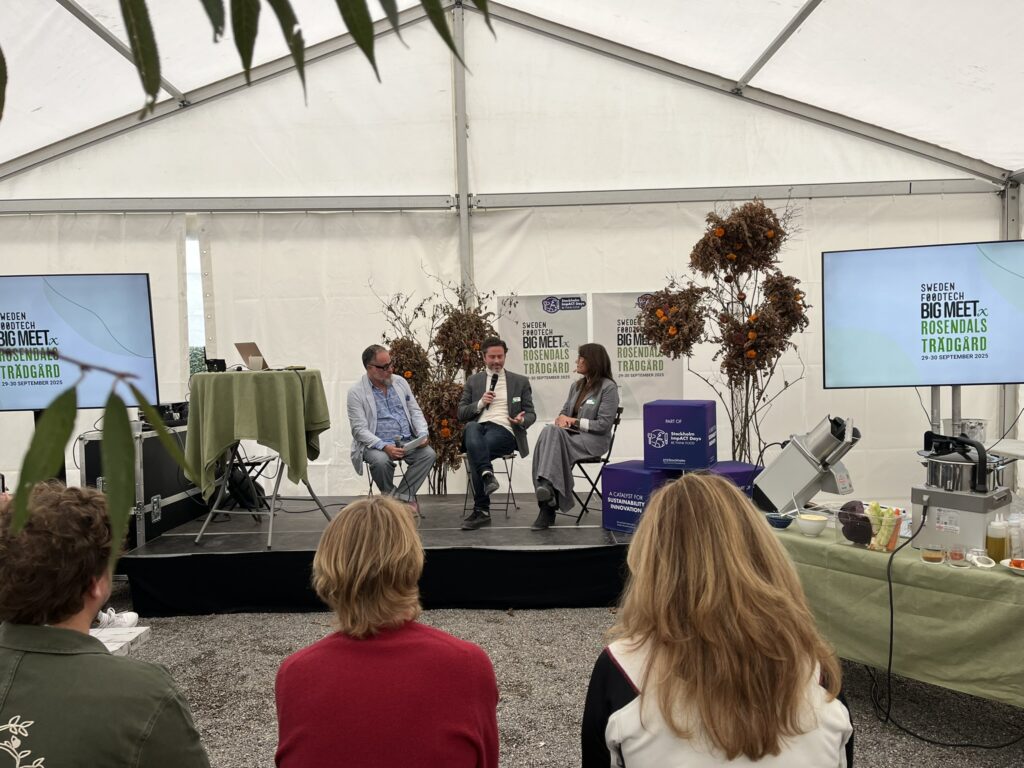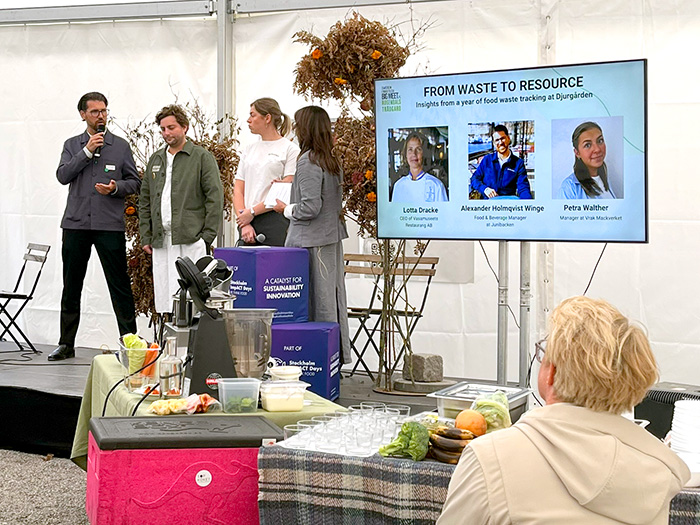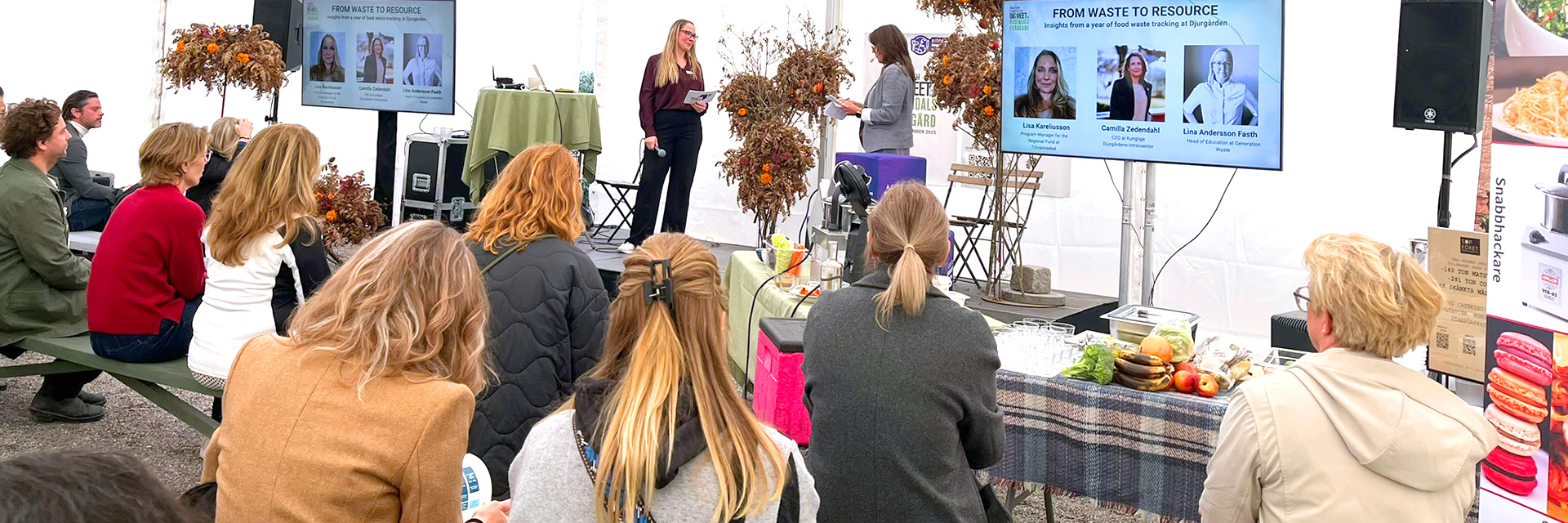The Royal Djurgården Society, is made up of 62 members. This unique island of Djurgården, Scandinavia’s #1 attraction, brings together museums, theaters, gardens, art galleries, amusement parks- and of course, restaurants. Together, we welcome more than 15 million guests each year. With that comes a responsibility: we have the ambition to make a positive impact and act as a living world exhibition on sustainability.
Responsibility for 15 million guests
As we are working closely together it has been natural to change the narrative from “What’s in it for me?” to “How can I contribute?.” With 15 million hungry guests, building a sustainable food culture is essential for reaching our sustainability goals. We were pleased to be a part of Stockholm ImpACT days and Re:thinking Food, as Stockholm becomes an international meeting place where innovation meets sustainable business ideas.
On September 30th we had the privilege to hold a seminar where we discussed our testbed for sustainable food culture. The seminar was held during their two-day Stockholm Food Tech “Big Meet” at Rosendals Trädgård.

We were proud to have been invited by Stockholm Business region to talk about our journey minimizing food waste at an event like Big Meet. We shared the stage with our sustainability community, Generation Waste and Tillväxtverket, whose financial support helped fund our journey. From farm-to-table restaurants to gelato kiosks, hotdog stands, and food trucks, Djurgården’s restaurants have put competition aside to work together against food waste. Starting the important dialog and learning from each other.

From measuring to change – concrete results and new insights
To drive change, we launched a one-year project. “Circular and resource efficient” using the Generation Waste platform to measure and reduce food waste. We have learned a lot as this part of the project now comes to an end. Valuable lessons have emerged about challenges, motivators, and best practices. It got a dialog going between all of our members. The results speak for themselves: participating restaurants reduced their food waste by an average of 36%. We will all benefit from the new knowledge learned. Many have chosen to continue measuring through the Generation Waste platform. The seminar we held at Big Meet shared what this project looked like for us. We had three of our members share their personal experiences in measuring and reducing waste.

Alexander Holmqvist Winge – Junibacken
As Food & Beverage Manager at Junibacken, Alexander and his team were one of the first to start measuring food waste. The decision stemmed from recognizing how much food was being wasted. Obviously that went against the museum’s values—especially since their mission focuses on children and future generations.
Although, getting staff on board wasn’t without challenges, the process sparked new insights and contributed to a stronger team spirit. Dishwashers, often overlooked in restaurants, found new pride in their role by providing feedback on what was being thrown away. This opened dialogue with the kitchen: Was a dish unpopular, or were portion sizes too large? As a result these conversations not only reduced waste but also highlighted the value of every team member.
Alexander’s advice to others considering the journey: “Just dare to try—and have fun with it.” As an example of their creativity, Junibacken is now testing a circular food model by turning leftover pancakes into bread.
Jonas Bolling – Rosendals Trädgård Food and Beverage
At Rosendals Garden, sustainability and circular food principles guide menu design. Food & Beverage Manager Jonas Bolling encouraged others to start small: focus on one area, like measuring leftover bread or salad at lunch. Breaking it down makes the process manageable and impactful.
He emphasized that measuring food waste is a win–win. Less waste means clearer insights for chefs, smarter purchasing decisions, and ultimately cost savings. Environmental values are a strong motivator, Jonas noted that financial incentives can help bring the whole team on board.
Petra Walther, Manager at Vrak Mackverket
Petra highlighted the importance of fostering a trusting, no-shame environment. At times there will be more leftovers than expected, and that’s okay. The goal isn’t to chase perfect numbers, but to uncover facts and understand reality. Keeping the team motivated and aligned with the bigger purpose is what sustains long-term impact.
Together, Djurgården’s restaurants have shown that collaboration can transform challenges into results—and pave the way for a sustainable food culture that inspires millions of visitors each year.

The project aims to achieve the global goal of halving food waste within the project’s duration. (12.3)

A reduction in food waste leads to better resource utilization and reduced carbon dioxide emissions. (13)

The project is based on collaboration between various stakeholders on Djurgården, and authorities, foundations, and private, and non-profit organizations, and is supported by the European Regional Development Fund (17.7)

